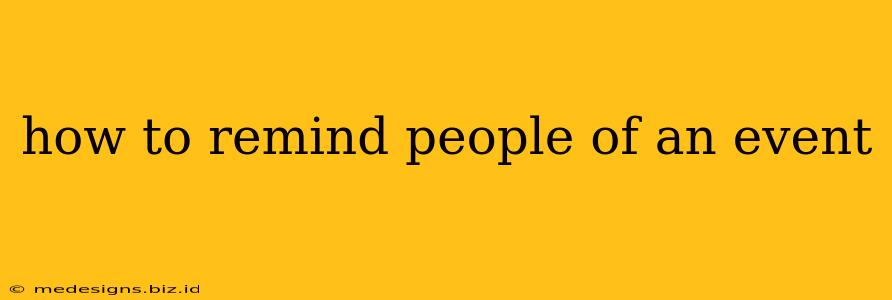Planning an event is hard work! You've poured your heart and soul into the details, and now it's time to make sure everyone attends. Forgetting about an event is easy, so effective reminders are crucial for maximizing attendance. This guide will walk you through various strategies to remind people about your upcoming event, ensuring a packed house and a successful celebration.
The Importance of Event Reminders
Sending timely and engaging reminders isn't just polite; it's essential for event success. Here's why:
- Increased Attendance: Simple reminders significantly boost attendance rates. People get busy, and a gentle nudge can be the difference between attendance and a missed opportunity.
- Reduced No-Shows: Reminders help prevent last-minute cancellations and no-shows, optimizing your resources and minimizing wasted effort.
- Improved Organization: Reminders allow you to gauge expected attendance, enabling better logistical planning, such as seating arrangements or catering.
- Enhanced Engagement: Well-crafted reminders can re-ignite excitement and anticipation for your event.
Methods for Sending Event Reminders
There are many ways to remind attendees about your upcoming event. Choose the method(s) that best suits your audience and event type.
1. Email Reminders:
- Timing is Key: Send a series of emails. A first reminder a week before, a second reminder 2 days before, and possibly a final reminder the day of the event.
- Personalize Your Message: Avoid generic emails. Use the recipient's name and include a personal touch related to their involvement (e.g., "We're so excited to see you at the conference, John!").
- Include Key Details: Reiterate the date, time, location, and any important instructions or information. Include a clear call to action (e.g., "RSVP by [Date]")
- Make it Visually Appealing: Use a professional email template with your event logo and engaging visuals.
2. Text Message Reminders (SMS):
- Short and Sweet: SMS messages are best for brief, impactful reminders. Keep it concise and include only the most essential information.
- Consider Opt-ins: Only send texts to people who have explicitly opted in to receive them. Respect their privacy.
- Timing: Similar to emails, send a series of texts, starting a few days before the event.
3. Social Media Posts:
- Create Engaging Content: Use eye-catching images and videos to promote your event on platforms like Facebook, Instagram, and Twitter.
- Targeted Advertising: Consider using paid social media advertising to reach a wider audience.
- Run Contests and Giveaways: Increase engagement by running contests or giveaways related to your event.
4. Website/Event Platform Updates:
- Dedicated Event Page: Create a webpage specifically for your event with all the necessary details and a countdown timer.
- Automated Reminders: Utilize event management platforms with built-in reminder features.
5. Phone Calls (For VIPs):
- Personal Touch: A personal phone call adds a special touch, especially for important guests or sponsors.
Crafting Effective Event Reminders
No matter the method, your reminders should be:
- Clear and Concise: Avoid jargon or overly complicated language.
- Action-Oriented: Include a clear call to action (e.g., "Click here to RSVP," "See you there!").
- Enthusiastic: Convey excitement about the event to encourage attendance.
- Professional: Maintain a consistent brand image throughout your communication.
Tracking RSVPs and Follow-up
- Use an RSVP System: Employ an online RSVP system or spreadsheet to track responses.
- Follow Up on Non-Responders: Send a gentle follow-up email or text message to those who haven't responded.
- Confirm Attendance: Send a final confirmation email to those who have RSVP'd.
By implementing these strategies, you can ensure your event is a resounding success. Remember that consistent and engaging communication is key to maximizing attendance and creating a memorable experience for everyone involved.
